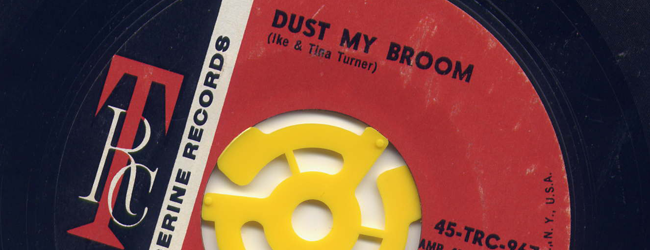This is the latest installment in our weekly series, The Language of the Blues, in which author and rocker Debra Devi explores the meaning of a word or phrase from a blues song. Come back every week for the latest! Devi’s award-winning book, The Language of the Blues: From Alcorub to ZuZu, includes a foreword by Dr. John and is blurbed by Bonnie Raitt and Joe Bonamassa. Get your signed copy at Bluescentric.com!

Sweeping the house after dark is still considered impolite in some African American families. This tradition comes from the West African belief that one should be careful not to accidentally sweep out of the house any benevolent gods or ancestral spirits who have come in for the night to watch over a sleeping family and protect it from evil spirits.
On the other hand, when you do have evil spirits in the house, sweeping them out can be very effective. According to hoodoo riddance rituals, dusting one’s broom first with magic powder will sweep a house free of unwanted supernatural (and embodied!) houseguests.
Perhaps this was what Elmore James was planning when he sang in “I Believe I’ll Dust My Broom”:
I’m gonna get up in the morning, I believe I’ll dust my broom
The black man you been loving, girlfriend, can get my room
“I Ain’t Superstitious,” by Willie Dixon, also hints at the use of sweeping to mess with someone, with the line “Don’t sweep me with no broom/I might get put in jail.”
So, was Robert Johnson threatening to leave, while actually preparing a hoodoo ritual to get rid of his rival? Or did he plan to express his rage at his girlfriend’s cheating in a different fashion?
In Yoruba culture, the god of terror and moral retribution, Obaluaiye, walks the earth ready to strike the arrogant and the immoral with disease. He carries a broom that he can use to conjure up smallpox (shoponnon). When his morals are offended, he takes a whiskbroom with long fibers sprinkled with camwood paste and spreads sesame seeds (yamoti) on the ground. He begins sweeping the seeds in circles. “As the broom begins to touch the dust and the dust begins to rise, the seeds, like miniature pockmarks, ride the wind with their annihilating powers: the force of a smallpox epidemic is thereby unleashed,” Robert Farris Thompson explained in Flash of the Spirit: African & Afro-American Art & Philosophy
The cult of Obaluaiye was banned in Nigeria in 1917 by British authorities when its priests were accused of deliberately spreading smallpox. The cult went underground, worshipping the smallpox god under different names, such as Oluwa. To this day in Nigeria it’s considered dangerous to speak of him.
His menace survives in gentler form in the display of brooms in Yoruba households that are decorated with cowry shells and carvings, and are believed to have the power to uphold morality and make things right.
Then again, maybe Johnson was just saying he was outta there. “Dust my broom?” responded Johnson’s common-law stepson, guitarist Robert Jr. Lockwood, when I asked him what he thought Johnson meant. “What he meant was leaving. Dust my broom meant he was leaving!”
PHOTO CAPTION:
Johnson took this self-portrait in a photo booth in the early 1930s. (© 1986 Delta Haze Corporation, all rights reserved; used by permission)
Songs:
“I Believe I’ll Dust My Broom”- Robert Johnson
“I Ain’t Superstitious”- Willie Dixon, recorded by Howlin’ Wolf (Chester Burnett)
Video:
Robert Johnson – “I Believe I’ll Dust My Broom”-


